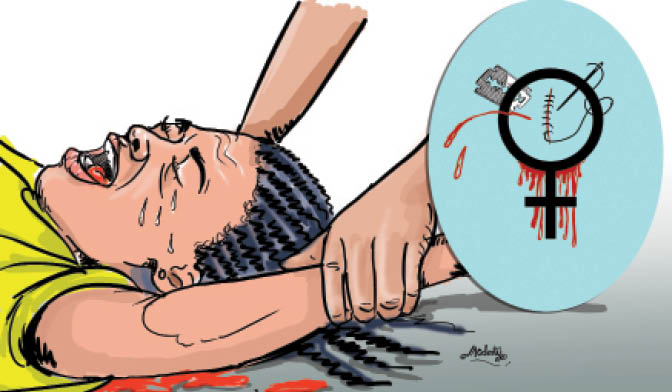In a joint statement to mark the 2023 International Day of Zero Tolerance for Female Genital Mutilation, UNICEF and the United Nations Population Fund said Nigeria accounts for the third highest number of women and girls who have undergone Female Genital Mutilation (FGM).
According to the statement, 4.3 million girls are at risk of FGM in 2023, while the number is projected to reach 4.6 million by 2030.
With such staggering figures, UN agencies say the world would miss the target of ending FGM by 2030 if urgent actions are not taken.
The agencies identified conflict, climate change, rising poverty, and inequality as factors hindering efforts to transform gender and social norms that reinforce FGM practice and other programmes designed to protect women and children.
President Buhari receives The Gambian, Indian, Sri Lankan and Iranian envoys [PHOTOS]
Obi defeats Tinubu, Atiku in Cross River
However, it is not entirely gloomy and doom; the UN system acknowledged that there has been a significant decline in cases of FGM in Nigeria.
FGM prevalence in Nigeria is decreasing among women aged 15-49 according to data from the 2021 Multiple Indicator Survey (18 per cent to 15 per cent 2016-17/2021).
“Similarly, the prevalence among girls aged 0-14 decreased from 25 per cent to eight per cent during the same time period (MICS 2021).
“This significant decrease in prevalence among girls aged 0-14 is a welcome development, given that an estimated 86 per cent of females aged 15-49 were subjected to FGM before the age of 5 (NDHS 2018),” it said.
Female genital mutilation comprises all procedures that involve partial or total removal of the external female genitalia, or other injuries to the female genital organs for non-medical reasons.
According to the WHO, FGM is classified into four major types, namely: type 1 which is the partial or total removal of the clitoral glans and/or the prepuce/clitoral hood and type 2 is the partial or total removal of the clitoral glans and the inner folds of the vulva, with or without the removal of the external folds of the vulva.
Type 3 is the narrowing of the vaginal opening through the creation of a covering seal, with or without removal of the clitoral prepuce/clitoral hood and glans; while type 4 includes all other harmful procedures to the female genitalia for non-medical purposes, such as pricking, piercing, incising, scraping and cauterising the genital area.
Mr Peter Hawkins, UNICEF Representative in Nigeria, said science has not established any health benefit of the practice.
“The practice of FGM not only has no health benefits – it is deeply harmful to girls and women, both physically and psychologically.
“It is a practice that has no place in our society today and must be ended, as many Nigerian communities have already pledged to do.
“Millions of girls are being robbed of their childhoods, health, education, and aspirations every day by harmful practices such as FGM,” he said.
Indeed there are immediate and long-term complications that girls and women subjected to FGM risk, including excessive bleeding, severe pain, infection, urinary problems, menstrual problems, psychological problems and even death.
Ms Chinyereugo Onyekwere, a clinical psychologist, whose organisation provides psycho-social support for traumatised and vulnerable people, was particular about the psychological effect of FGM on women and girls.
“Women who experience FGM are noted to be susceptible to depression, anxiety, and post-traumatic stress disorder.
“This is as a result of the impact of this practice of childhood abuse and the physical health consequences as a result of the practice.
“A lot of these practices are done forcefully and may not have concerns for hygiene. Many women and girls feel violated, develop shame and lack trust in people,” she said.
UNICEF said the South East (35 per cent) and South West (30 per cent) have the highest prevalence of FGM in Nigeria, while the North East has the lowest with 6 per cent.
To further drive home the disparity, Imo has a prevalence rate of 62 per cent, while northeastern states like Adamawa and Gombe have less than 1 per cent.
What is responsible for such disparity and why has FGM practice persisted in spite of the health risk it poses to women and girls?
FGM is entrenched in the culture and tradition of places where it is being practised because they see it as a sort of rite of passage to prepare girls for adulthood and marriage.
In many Nigerian societies where FGM prevalence is high, there is a superstitious belief attached to the practice in order to suppress girls’ sexuality or ensure their chastity.
In its most radical form, the cultural perception is to ostracise women whose genitalia were not cut because they are dishonorable and unworthy.
In fact, the medicalisation of FGM, where the procedure is carried out in a sterile setting by a healthcare provider, indicates that many people still hold on to its acceptability.
A complete abandonment of the practice is, therefore, seen as part of the wider encroachment of western civilisation on a people’s culture and tradition.
Experts warn that ending FGM in seven years’ time by 2030 appears to already have a bleak prospect. However, stakeholders have to intensify action towards significantly reducing its prevalence.
One effective way to achieve this, experts say, is by increasing social and behaviour change communication, which is the strategic use of messaging approaches to promote changes in knowledge, attitudes, norms, beliefs and behaviours.
Such an approach should actively involve traditional institutions and community leaders, who are custodians of culture in their communities, as well as faith-based organisations.
Also, individual, group and community efforts that create awareness and call to action against FGM should be incentivised to encourage more participation. (NANFeatures)


